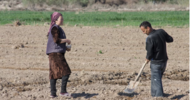“There is no villagization programme,” Sai Ramakrishna Karuturi, founder of Karuturi Global, told Mint via telephone. “This is a completely jaundiced western vision. They assume anything in Africa has to be done by the whites and the Chinese and Indians should have businesses only in their own countries.”
Ethiopia has forced at least 70,000 people off their land so it can lease fertile fields to foreign investors, a move that has left some locals starving in barren, remote villages.
- Toronto Star
-
18 January 2012
BBC radio investigates report by Human Rights Watch that claims Britain is indirectly funding a brutally enforced resettlement programme in Ethiopia.
The Ethiopian government has denied forcibly relocating tens of thousands of people off their land to make way for foreign investors.
Many of the areas from which people are being moved are slated for leasing by the Ethiopian government for commercial agricultural development, according to a new report from Human Rights Watch.
Rich soil, a tropical climate, and an abundance of water: the region of Gambela in the west of the country is fertile. Foreign investors are renting thousands of hectares of it to develop intensive agriculture without regard for the environment and the population, reports Le Monde.
Sai Ramakrishna Karuturi talks to the Times of India about his African safari.
- Times of India
-
01 January 2012
Land has been the play-thing of centralising authoritarians throughout Ethiopia's recent history.
- openDemocracy
-
31 December 2011
The article suggests the need to render the government a custodian (and not owner) of land in conformity with the FDRE Constitution
- Mizan Law Review
-
29 December 2011
A Saudi Arabian company has leased tens of thousands of acres in western Ethiopia to grow rice for export. The Ethiopian government says it will help provide food security for its citizens, but some who live in the region, say they’re not seeing any benefits.
Investment by Indian-owned Karuturi Global has raised questions about whether Ethiopia is literally giving away the farm, or conversely, launching a 'green revolution' to help Ethiopia feed itself.
- CS Monitor
-
23 December 2011
Joining the neo-colonial bandwagon, Indian companies are taking over agricultural land in African nations and exporting produced food at the cost of locals
- Goimonitor.com
-
21 December 2011
Domestic and foreign investors are expected to grow sugar cane and other cash crops on a large-scale in the south of Ethiopia, an area known for its numerous indigenous tribes.
In three years, 15,000ha will be covered with a sugarcane plantation in Gambela Province.
- Oromiya Government
-
19 December 2011
Karuturi Global is now one of the biggest private land owners in the world. They have invested over a quarter of a billion dollars in Ethiopia and Kenya alone. BBC reports.
"We are using knowledge and resources from Latin America and North America, capital from this part of the world (India) and land from Africa to make hopefully a heady cocktail,"says Sai Ramakrishna Karuturi
Oakland Institute speaks about the findings of their latest round of in-depth research into land grabs in Africa.
- Pambazuka
-
09 December 2011
In the acceptance speech for the 2011 ‘Alternative Nobel Prize’, GRAIN demands an immediate end to land grabbing and a restitution of lands to local communities.
Saudi Star Agricultural Development Plc, perhaps the biggest agro industry firm in Ethiopia, has added a big name to its roaster: Fikru Desalegn, former state minister for Capacity Building,
“We have finalised deals with four big agro companies in India for joint ventures for different crops that we are looking at growing – rice, maize, oil palm and sugarcane,” says Karuturi.
- Economic Times
-
04 December 2011
The 19th century had the Great Scramble for Africa, when developed nations raced for several decades to lay claim to new territories and their riches. This century may yet be known as the Great Selloff of Africa.
- Toronto Star
-
03 December 2011
The following report, by independent researcher Anna Bolin, explores the global trends and influences at work behind agriculture mega-projects like MIFEE in Papua.
- Down to Earth
-
30 November 2011
Foreign investors aren't just after land in Africa. Access to water is essential – which can bring them into direct competition with the needs of local communities
- The Guardian
-
24 November 2011
Myriad small farmers in Africa are being set up to fail by multinational corporations that end up assuming their land, a Canadian professor says.
Since the financial and food crises of 2008, the World Bank Group has incentivized and facilitated land grabs in several countries in Africa, Latin America and parts of Asia.
- World Press
-
16 November 2011
Corporate agriculture is not about food production or satisfying the needs of the undernourished or downright starving but about producing profit. How long can it be before its limits are reached?
- worldsocialism.org
-
11 November 2011
Multinational corporations are buying enormous tracts of land in Africa, putting countries on the path to increased food insecurity, environmental degradation, increased reliance on aid and marginalisation of farming and pastoralist communities.
- Pambazuka
-
03 November 2011
Tanzanian peasaants complain that the government has been allocating huge tracts of land to certain investors in the district, while refusing to allocate the same pieces of land to local groups that had applied for them.
- The Citizen
-
03 November 2011
One of the manifestations of the greed of Africa's domestic plutocrats and their imperial overlords is the massive land grab that we are witnessing today.
- Pambazuka
-
02 November 2011
Foreign interests into the South Sudan pie have managed to secure some 5.74 million hectares of land for agribusiness concerns namely agriculture, forestry, biofuels, eco-tourism and carbon trading.
- Norwegian Aid
-
31 October 2011















